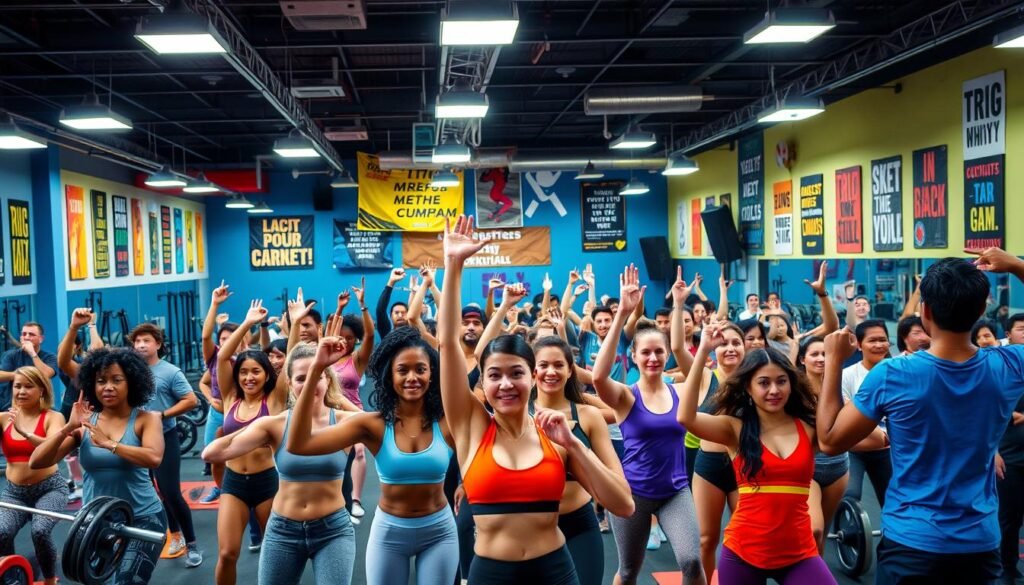Did you know 15% of adults avoid the gym because they’re unsure about the machines? This shows how common gym anxiety is when starting to work out.
Finding motivation to exercise can be tough when you feel self-conscious. Whether you’re new to the gym or feel intimidated, you’re not alone. Many people struggle with gym anxiety, no matter their fitness level.
Knowing your feelings are normal is the first step to feeling more confident. Your mental health is just as important as your physical health when starting a fitness journey. Learning tips and strategies to overcome gym anxiety is key to success.
Key Takeaways
- Gym anxiety is extremely common and affects many people
- Mental preparation is as important as physical preparation
- Everyone starts somewhere in their fitness journey
- Structured approaches can help reduce workout intimidation
- Confidence building is a gradual process
Understanding Gym Anxiety and Its Common Triggers
Walking into a gym can feel daunting. It’s like stepping into a world full of fitness hurdles. Gym anxiety stops many from reaching their fitness goals. It’s a common issue that affects millions trying to improve themselves.
What Causes Gym Anxiety
Gym anxiety comes from many psychological and social factors. These can make it hard to stay motivated. The main causes are:
- Fear of judgment from others
- Not knowing how to use the equipment
- Concerns about body image
- Feeling like you don’t belong or are inexperienced
“Anxiety doesn’t define your fitness level – it’s just a challenge to beat.” – Fitness Motivation Expert
Recognizing the Signs
Knowing when you have gym anxiety is key to beating it. Signs include:
- Feeling your heart race when thinking about working out
- Staying away from the gym
- Feeling tense
- Worrying too much about how you’ll do
Why It’s More Common Than You Think
Studies show gym anxiety is common. Almost 30% of adults have anxiety disorders, with many worried about fitness. A study with 116 college-age women found big barriers:
| Anxiety Trigger | Percentage |
|---|---|
| Fear of Judgment | 45% |
| Lack of Equipment Knowledge | 35% |
| Body Image Concerns | 20% |
Most people at the gym are focused on their own routines. They’re not watching you. Every step you take towards your fitness goals boosts your confidence.
Creating a Pre-Gym Strategy for Success
Starting a fitness journey can seem daunting. But, a good pre-gym plan can change your workout routine and help beat gym anxiety. Mental health strategies are key to building confidence and staying on track.
Before you go to the gym, think about these important steps:
- Research your gym’s layout and equipment thoroughly
- Plan your workout routine in advance
- Set clear, achievable fitness goals
- Choose off-peak hours for initial visits
“Preparation is the key to confidence” – Fitness Motivation Experts
Your mental prep can greatly affect your gym visit. Wear comfy workout clothes that boost your confidence. Arriving early lets you get to know the gym and meet instructors, easing anxiety.
Here are more mental health tips for staying motivated:
- Visualize your success before workouts
- Create a supportive playlist
- Practice positive self-talk
- Remind yourself of your personal fitness goals
Remember, every fitness journey starts with one step. Your pre-gym strategy is about making exercise comfortable and empowering, tailored just for you.
Essential Preparation Tips for First-Time Gym-Goers
Starting at the gym for the first time can be scary. But, getting ready and knowing what to expect helps a lot. Your first time at the gym is key to starting good workout habits. These habits will help you get stronger and reach your fitness goals.
Getting used to the gym needs careful planning and a positive attitude. Here are some key tips to make your first time at the gym a success:
Researching Your Gym Facilities
- Check gym peak hours (typically 6-8:30 am and 5:30-8 pm)
- Explore available equipment and group fitness classes
- Request an initial orientation session
- Understand the gym’s layout and rules
Planning Your Workout Routine
Having a workout plan helps you feel less nervous and gives you direction. Aim for a mix of exercises that fit your current fitness level.
| Workout Focus | Recommended Frequency | Duration |
|---|---|---|
| Full Body Exercises | 3-4 days per week | 45-60 minutes |
| Strength Training | 2-3 days per week | 30-45 minutes |
| Cardio | 2-3 days per week | 20-30 minutes |
Setting Realistic Expectations
Remember, getting better takes time. Avoid comparing yourself to others and focus on your own journey. Start with easy goals and slowly make them harder as you get more confident.
“The only bad workout is the one that didn’t happen.” – Unknown
Wearing comfy, breathable clothes makes your gym time better. Pick clothes that move well and make you feel good.
- Invest in proper workout clothing
- Bring a water bottle
- Consider bringing a gym buddy for support
- Use meditation techniques to manage pre-workout anxiety
By following these tips, you’ll turn gym anxiety into a chance for growth and getting fit.
Fitness motivation, gym anxiety, confidence building, workout tips, mental health
Building a positive mindset is key to overcoming fears and reaching your fitness goals. How you think can change your gym experience and your overall health.
Working out has big benefits for your mind, not just your body. It can help you manage stress, lower anxiety, and increase self-confidence.
“Exercise is not just about physical transformation, but mental liberation.” – Fitness Expert
- Release endorphins through consistent physical activity
- Build mental resilience with structured workout routines
- Create achievable fitness milestones
- Develop a supportive inner dialogue
The Department of Health and Human Services says adults should do at least 150 minutes of moderate aerobic activity each week. This isn’t just for your body—it’s also for your mind.
| Activity Type | Mental Health Impact | Recommended Frequency |
|---|---|---|
| Aerobic Exercise | Reduces Anxiety | 150 minutes/week |
| Strength Training | Boosts Self-Confidence | 2-3 times/week |
| Interval Training | Enhances Mood | 1-2 times/week |
Overcoming fears takes time. Start small, celebrate each win, and remember your mental journey is as vital as your physical one.
Building Confidence Through Proper Gym Etiquette
Starting at the gym can be tough. Building self-confidence means knowing the rules that make everyone feel good. Your mental health and exercise journey depend on a positive gym experience.
Mastering gym basics is key to feeling confident. Let’s look at the important things that help you feel at ease in your fitness space.
Understanding Basic Gym Rules
- Always wipe down equipment after use
- Respect personal space of other gym members
- Keep conversations low and considerate
- Put weights back in their designated areas
- Avoid monopolizing equipment during peak hours
Equipment Usage Guidelines
Knowing how to use equipment is vital for confidence and safety. Here are some tips:
- Ask staff for equipment orientation
- Watch tutorial videos before trying new machines
- Start with lighter weights to practice correct form
- Use safety features on all equipment
Interacting with Other Gym Members
Talking to others can be scary, but most are focused on their workouts. Here’s how to handle gym interactions:
| Situation | Recommended Approach |
|---|---|
| Sharing Equipment | Ask politely to “work in” between sets |
| Asking for Help | Approach staff or friendly-looking members |
| Personal Space | Maintain respectful distance during workouts |
“Confidence comes from knowing you belong, just like everyone else in the gym.” – Fitness Expert
By following these tips, you’ll turn gym anxiety into a sense of belonging. Your mental health and exercise routine will improve with a positive, respectful gym attitude.
Choosing the Right Time and Environment for Your Workouts

Getting motivated at the gym begins with picking the best time and place. Your fitness journey is unique. Finding the right spot can really help you feel more confident in your workouts.
Timing is key when facing fitness fears. Here are some tips for a great gym experience:
- Go during off-peak hours to avoid crowds
- Look for gyms with beginner zones
- Try different times for your workouts
Busy hours can be tough for newbies. Early or late times often mean more room and less stress. Some gyms have women-only areas or quiet spots for those starting out.
“The right environment transforms exercise from a challenge to an opportunity.” – Fitness Motivation Expert
| Gym Time | Crowd Level | Recommended For |
|---|---|---|
| Early Morning (5-7 AM) | Low | Beginners, Quiet Workout |
| Midday (11 AM-2 PM) | Medium | Flexible Schedules |
| Late Evening (8-10 PM) | Low | Night Owls, Less Crowded |
Your comfort is the most important thing. Pick a gym that fits your goals and comfort. With the right mindset, gym anxiety turns into excitement for your workouts.
Developing a Progressive Training Approach
Starting a fitness journey needs careful planning and a focus on mental wellbeing. Your training should build confidence and keep a positive mindset during workouts.
Starting a fitness program can seem daunting. But breaking it down into smaller steps can make it easier. The goal is to find a path that supports both your body and mind.
Starting with Basic Exercises
Begin with basic exercises that strengthen your core and boost confidence. Here are some key exercises to start with:
- Bodyweight squats
- Push-ups (modified if needed)
- Walking or light jogging
- Planks for core stability
Gradual Intensity Increase
Increasing your challenge gradually is key for mental health. Studies show that 150 minutes of moderate exercise a week can greatly improve your mental state.
| Week | Exercise Intensity | Duration |
|---|---|---|
| 1-2 | Low | 15-20 minutes |
| 3-4 | Moderate | 25-30 minutes |
| 5-6 | Increased | 35-40 minutes |
Tracking Your Progress
Keeping a record of your fitness journey can motivate and give you insights. Physical activities that work many muscles release endorphins, which improve mood and lower stress.
“Progress is not about perfection, but consistent effort and self-compassion.” – Fitness Mental Health Expert
Remember, your fitness journey is your own. Listen to your body, celebrate small wins, and be patient and kind with yourself.
Building a Supportive Fitness Network

Staying motivated in exercise can be tough. But, having a strong support system can change your fitness journey. Studies show that 88% of fitness trainers worldwide get high ratings. This shows the power of connections in your fitness community.
Here are some tips to overcome gym insecurities and build a positive body image:
- Work out with a buddy for accountability
- Join group classes to connect with others
- Find online fitness groups
- Get involved in local sports or fitness clubs
“Your fitness network can be the difference between giving up and pushing through challenges.”
Personal training brings special benefits for those who want expert help. A trainer can:
- Show you how to do exercises right
- Make workout plans just for you
- Give you personal motivation
- Help you feel more confident at the gym
| Support Option | Benefits |
|---|---|
| Workout Buddy | More accountability, shared motivation |
| Group Classes | Feeling part of a community, structured setting |
| Personal Trainer | Expert advice, tailored support |
Surrounding yourself with positive, supportive people makes your fitness journey better and longer-lasting.
Maintaining Motivation and Overcoming Setbacks
Staying motivated while exercising can be tough. But it’s key for keeping fit long-term. Your fitness journey has ups and downs. Learning to handle these challenges helps manage stress and anxiety through fitness.
Studies show that keeping up with exercise motivation is important. Adults who stay active see big mental health wins. Just 15 minutes of daily running can cut depression risk by 26%.
Creating Achievable Goals
Overcoming gym insecurities starts with setting SMART goals:
- Break big goals into smaller steps
- Make goals clear and measurable
- Set realistic deadlines
- Keep track of your progress
“Small progress is progress. Celebrate every step forward.”
Celebrating Small Victories
It’s important to celebrate your wins, no matter how small. Research shows that celebrating early wins keeps you committed to exercise.
Dealing with Temporary Setbacks
Setbacks are part of any fitness journey. The trick is to see them as chances to learn, not as failures. Focus on moving forward and making healthy choices right away.
- Don’t get stuck on past mistakes
- Get back to your routine quickly
- Stay positive
- Adjust your goals if needed
Remember, your fitness path is your own. By using these tips, you can stay motivated, build resilience, and manage stress through exercise.
Mental Strategies for Long-Term Success
Building a healthy body image and managing stress through fitness needs strong mental strategies. Your mind is the most important muscle in your fitness journey. It can turn challenges into chances for growth.
Mental preparation is essential for lasting fitness success. Studies show it takes about 21 days to build a habit. This means regular mental training can change how you see exercise.
“Your body hears everything your mind says.” – Naomi Judd
Here are some mental strategies to try:
- Practice positive self-talk to fight off negative thoughts
- Use visualization to picture yourself succeeding in workouts
- Have a growth mindset that sees challenges as chances to get better
- Set process goals instead of just focusing on results
Visualization is a powerful tool, studies show. By imagining your workout, you train your brain to be confident and excited about fitness.
Dealing with stress and anxiety through fitness gets easier when you see progress isn’t always straight. View each workout as a chance to learn, grow, and connect with your body in a healthier way.
Remember, building a healthy body image is a long-term effort. It needs consistent work and kindness towards yourself. Your mental mindset is more important than any single workout for your success.
Conclusion
Overcoming gym anxiety is a journey that goes beyond just working out. By using smart workout tips, you can turn your fitness goals into a way to grow personally. Regular exercise boosts mental health, improving how you see yourself and your body.
Your journey to build confidence starts with knowing you’re not alone. Everyone who works out started where you are. Studies show that exercise makes you feel better, think clearer, and live better. By exercising regularly, you get stronger and more mentally tough, even outside the gym.
Managing gym anxiety takes time and kindness to yourself. Studies show that exercise greatly improves mental health, boosting how you feel about yourself and your thinking skills. Every workout is a step towards better health, turning anxiety into strength.
Keep moving forward, even if it’s small steps. The world health organization says we should exercise at least 150 minutes a week. Celebrate each small win to build a lasting routine that improves your health. This way, gym anxiety becomes a source of strength and success.




